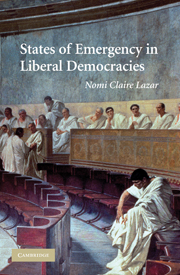Book contents
- Frontmatter
- Contents
- Acknowledgments
- States of Emergency in Liberal Democracies
- 1 The Problem of Emergency
- 2 Must Exceptionalism Prove the Rule?
- 3 Two Concepts of Liberalism
- 4 Are Rights Derogations Always Wrong?
- 5 The Rule of Law and the Roman Dictatorship
- 6 The Norms of Crisis Government
- Bibliography
- Index
2 - Must Exceptionalism Prove the Rule?
Published online by Cambridge University Press: 15 September 2009
- Frontmatter
- Contents
- Acknowledgments
- States of Emergency in Liberal Democracies
- 1 The Problem of Emergency
- 2 Must Exceptionalism Prove the Rule?
- 3 Two Concepts of Liberalism
- 4 Are Rights Derogations Always Wrong?
- 5 The Rule of Law and the Roman Dictatorship
- 6 The Norms of Crisis Government
- Bibliography
- Index
Summary
Let's begin by tracing the origins of exceptionalism in the history of political thought. There, as in contemporary theory, exceptionalism has been the dominant mode of confronting the problem of emergencies in constitutional regimes. As we shall see, the contemporary perception that states of exception are ‘normally’ time bound has lead to a critique that complains that states of exception have now come to prove the rule. I will show that this perspective is grounded in a failure to understand the fundamental nature of exceptionalism as a doctrine. Exceptionalism always implies a constantly exempted political figure, in contrast to democratic governance, which necessitates an always accountable political figure. By recognizing the implicit move toward permanent exemption, we see the merit in an alternative. While rights derogations may indeed be the rule, so is accountability when those rights derogations occur. Exceptionalism is a doctrine fundamentally incompatible with democratic accountability.
Hence the issue is not that states of exception now prove the rule, but rather that emergencies ought never to be conceptualized as exceptions to begin with. For, as I will argue in subsequent chapters, rights derogations are not temporally exceptional but rather are continuous with normal circumstances, and so if political leaders are to be held accountable in normal cases, why not in emergencies? Political leaders are never exempted from accountability when such derogations are made. Equating emergencies with exceptions, because emergencies necessitate such exemptions, is a dangerous game.
Exceptionalism is grounded in the claim that the usual norms cease to apply in emergencies.
- Type
- Chapter
- Information
- States of Emergency in Liberal Democracies , pp. 19 - 51Publisher: Cambridge University PressPrint publication year: 2009



